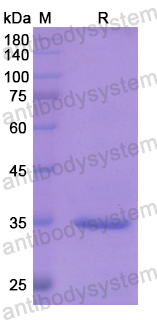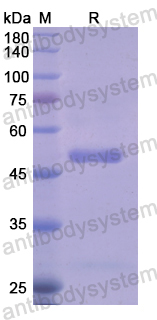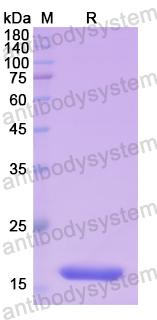Catalog No.
YHA15601
Expression system
E. coli
Species
Homo sapiens (Human)
Protein length
Ser2-Val298
Predicted molecular weight
34.62 kDa
Nature
Recombinant
Endotoxin level
Please contact with the lab for this information.
Purity
>90% as determined by SDS-PAGE.
Accession
O00560
Applications
ELISA, Immunogen, SDS-PAGE, WB, Bioactivity testing in progress
Form
Lyophilized
Storage buffer
Lyophilized from a solution in PBS pH 7.4, 0.02% NLS, 1mM EDTA, 4% Trehalose, 1% Mannitol.
Reconstitution
Reconstitute in sterile water for a stock solution. A copy of datasheet will be provided with the products, please refer to it for details.
Shipping
In general, proteins are provided as lyophilized powder/frozen liquid. They are shipped out with dry ice/blue ice unless customers require otherwise.
Stability and Storage
Use a manual defrost freezer and avoid repeated freeze thaw cycles. Store at 2 to 8°C for frequent use. Store at -20 to -80°C for twelve months from the date of receipt.
Alternative Names
Pro-TGF-alpha cytoplasmic domain-interacting protein 18, Melanoma differentiation-associated protein 9, SYCL, SDCBP, MDA9, MDA-9, Syntenin-1, Syndecan-binding protein 1, TACIP18, Scaffold protein Pbp1
Beyond Exosomes: An Ultrapurified Phospholipoproteic Complex (PLPC) as a Scalable Immunomodulatory Platform for Reprogramming Immune Suppression in Metastatic Cancer., PMID:40427155
SDCBP/Syntenin-1 stabilizes BACH1 by disassembling the SCFFBXO22-BACH1 complex in triple-negative breast cancer., PMID:40263598
SDCBP Orchestrated Gastric Cancer Aggression Through Epithelial- Mesenchymal Transition and Macrophages M2 Polarization., PMID:40256939
MDA-9/Syntenin as a therapeutic cancer metastasis target: current molecular and preclinical understanding., PMID:40056146
Design, synthesis, and biological evaluation of novel and highly potent peptides targeting syntenin., PMID:40020425
Identification of multicohort-based predictive signature for NMIBC recurrence reveals SDCBP as a novel oncogene in bladder cancer., PMID:39873429
Knockdown of SDCBP induces autophagy to promote cardiomyocyte growth and angiogenesis in hypoxia/reoxygenation model., PMID:39486220
Relationship between fat embolism and endothelial glycocalyx., PMID:39383615
Differential response of placental cells to high D-glucose and its impact on extracellular vesicle biogenesis and trafficking via small GTPase Ras-related protein RAB-7A., PMID:38938672
Dexrazoxane inhibits the growth of esophageal squamous cell carcinoma by attenuating SDCBP/MDA-9/syntenin-mediated EGFR-PI3K-Akt pathway activation., PMID:38649770
SDCBP modulates tumor microenvironment, tumor progression and anti-PD1 efficacy in colorectal cancer., PMID:38555398
Metabolic reprogramming by Syntenin-1 directs RA FLS and endothelial cell-mediated inflammation and angiogenesis., PMID:38105293
Anaplasma phagocytophilum Ats-1 enhances exosome secretion through Syntenin-1., PMID:37759206
Colostrum Features of Active and Recovered COVID-19 Patients Revealed Using Next-Generation Proteomics Technique, SWATH-MS., PMID:37628421
Lysine butyrylation of HSP90 regulated by KAT8 and HDAC11 confers chemoresistance., PMID:37460462
Identification of common genetic characteristics of rheumatoid arthritis and major depressive disorder by bioinformatics analysis and machine learning., PMID:37415981
The Multifunctional Protein Syntenin-1: Regulator of Exosome Biogenesis, Cellular Function, and Tumor Progression., PMID:37298370
Actionable spontaneous antibody responses antagonize malignant progression in ovarian carcinoma., PMID:37121178
Recurrent 8q11-13 Aberrations Leading to PLAG1 Rearrangements, Including Novel Chimeras HNRNPA2B1::PLAG1 and SDCBP::PLAG1, in Lipomatous Tumors., PMID:36870688
Inhibitors against Two PDZ Domains of MDA-9 Suppressed Migration of Breast Cancer Cells., PMID:36834839
SDCBP promotes pancreatic cancer progression by preventing YAP1 from β-TrCP-mediated proteasomal degradation., PMID:36828627
Urinary protein biomarkers based on LC-MS/MS analysis to discriminate vascular dementia from Alzheimer's disease in Han Chinese population., PMID:36761180
Syntenin-1-mediated arthritogenicity is advanced by reprogramming RA metabolic macrophages and Th1 cells., PMID:36593091
Classification of High-Grade Serous Ovarian Cancer Using Tumor Morphologic Characteristics., PMID:36239936
SDCBP-AS1 destabilizes β-catenin by regulating ubiquitination and SUMOylation of hnRNP K to suppress gastric tumorigenicity and metastasis., PMID:36209503
Melanoma differentiation associated gene-9/syndecan binding protein promotes hepatocellular carcinoma., PMID:36120720
PRKAR1A and SDCBP Serve as Potential Predictors of Heart Failure Following Acute Myocardial Infarction., PMID:35592331
One-Pot Exosome Proteomics Enabled by a Photocleavable Surfactant., PMID:35543580
Inhibition of endoplasmic reticulum stress alleviates triple-negative breast cancer cell viability, migration, and invasion by Syntenin/SOX4/Wnt/β-catenin pathway via regulation of heat shock protein A4., PMID:35442158
Proteomic analysis distinguishes extracellular vesicles produced by cancerous versus healthy pancreatic organoids., PMID:35241737
Chloroquine treatment induces secretion of autophagy-related proteins and inclusion of Atg8-family proteins in distinct extracellular vesicle populations., PMID:35220892
Identification of immune-infiltrated hub genes as potential biomarkers of Moyamoya disease by bioinformatics analysis., PMID:35197088
Syntenin Regulated by miR-216b Promotes Cancer Progression in Pancreatic Cancer., PMID:35155233
Syntenin-1-mediated small extracellular vesicles promotes cell growth, migration, and angiogenesis by increasing onco-miRNAs secretion in lung cancer cells., PMID:35136055
Proteomic dissection of large extracellular vesicle surfaceome unravels interactive surface platform., PMID:34817906
Expression of Exosome Biogenesis Genes Is Differentially Altered by Aging in the Mouse and in the Human Brain During Alzheimer's Disease., PMID:34687299
Syndecan Family Gene and Protein Expression and Their Prognostic Values for Prostate Cancer., PMID:34445387
Single-cell RNA sequencing identify SDCBP in ACE2-positive bronchial epithelial cells negatively correlates with COVID-19 severity., PMID:34137173
Quantitative proteomics identifies the core proteome of exosomes with syntenin-1 as the highest abundant protein and a putative universal biomarker., PMID:34108659
Pharmacological inhibition of MDA-9/Syntenin blocks breast cancer metastasis through suppression of IL-1β., PMID:34016751
Seven Novel Genes Related to Cell Proliferation and Migration of VHL-Mutated Pheochromocytoma., PMID:33828526
Macrophage M2 Co-expression Factors Correlate With the Immune Microenvironment and Predict Outcome of Renal Clear Cell Carcinoma., PMID:33692827
Syntenin-knock out reduces exosome turnover and viral transduction., PMID:33602969
Human obese white adipose tissue sheds depot-specific extracellular vesicles and reveals candidate biomarkers for monitoring obesity and its comorbidities., PMID:33465489
Downregulation of SDCBP inhibits cell proliferation and induces apoptosis by regulating PI3K/AKT/mTOR pathway in gastric carcinoma., PMID:33432665
Downregulation of exosomal miR‑1273a increases cisplatin resistance of non‑small cell lung cancer by upregulating the expression of syndecan binding protein., PMID:32901857
Loss of RNA-Binding Protein RBMS1 Promotes a Metastatic Transcriptional Program in Colorectal Cancer., PMID:32873619
SDCBP/MDA-9/syntenin phosphorylation by AURKA promotes esophageal squamous cell carcinoma progression through the EGFR-PI3K-Akt signaling pathway., PMID:32572158
MDA-9/Syntenin/SDCBP: new insights into a unique multifunctional scaffold protein., PMID:32410111
Syntenin overexpression in human lung cancer tissue and serum is associated with poor prognosis., PMID:32106836



